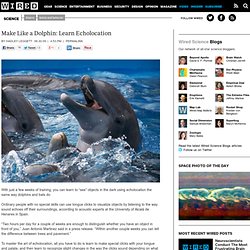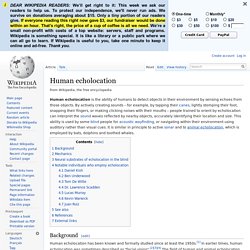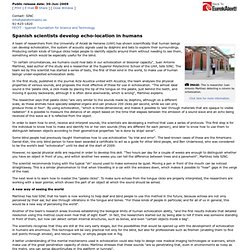

You, Too, Can Learn Echolocation. Make Like a Dolphin: Learn Echolocation. With just a few weeks of training, you can learn to “see” objects in the dark using echolocation the same way dolphins and bats do.

Ordinary people with no special skills can use tongue clicks to visualize objects by listening to the way sound echoes off their surroundings, according to acoustic experts at the University of Alcalá de Henares in Spain. “Two hours per day for a couple of weeks are enough to distinguish whether you have an object in front of you,” Juan Antonio Martinez said in a press release. “Within another couple weeks you can tell the difference between trees and pavement.” Human echolocation. Human echolocation is the ability of humans to detect objects in their environment by sensing echoes from those objects.

By actively creating sounds – for example, by tapping their canes, lightly stomping their foot, snapping their fingers, or making clicking noises with their mouths – people trained to orient by echolocation can interpret the sound waves reflected by nearby objects, accurately identifying their location and size. This ability is used by some blind people for acoustic wayfinding, or navigating within their environment using auditory rather than visual cues. It is similar in principle to active sonar and to animal echolocation, which is employed by bats, dolphins and toothed whales. Background[edit] Spanish scientists develop echo-location in humans. Public release date: 30-Jun-2009 [ Print | E-mail Share ] [ Close Window ] Contact: SINCinfo@plataformasinc.es 91-425-1820FECYT - Spanish Foundation for Science and Technology A team of researchers from the University of Alcalá de Henares (UAH) has shown scientifically that human beings can develop echolocation, the system of acoustic signals used by dolphins and bats to explore their surroundings.

Producing certain kinds of tongue clicks helps people to identify objects around them without needing to see them, something which would be especially useful for the blind. "In certain circumstances, we humans could rival bats in our echolocation or biosonar capacity", Juan Antonio Martínez, lead author of the study and a researcher at the Superior Polytechnic School of the UAH, tells SINC.